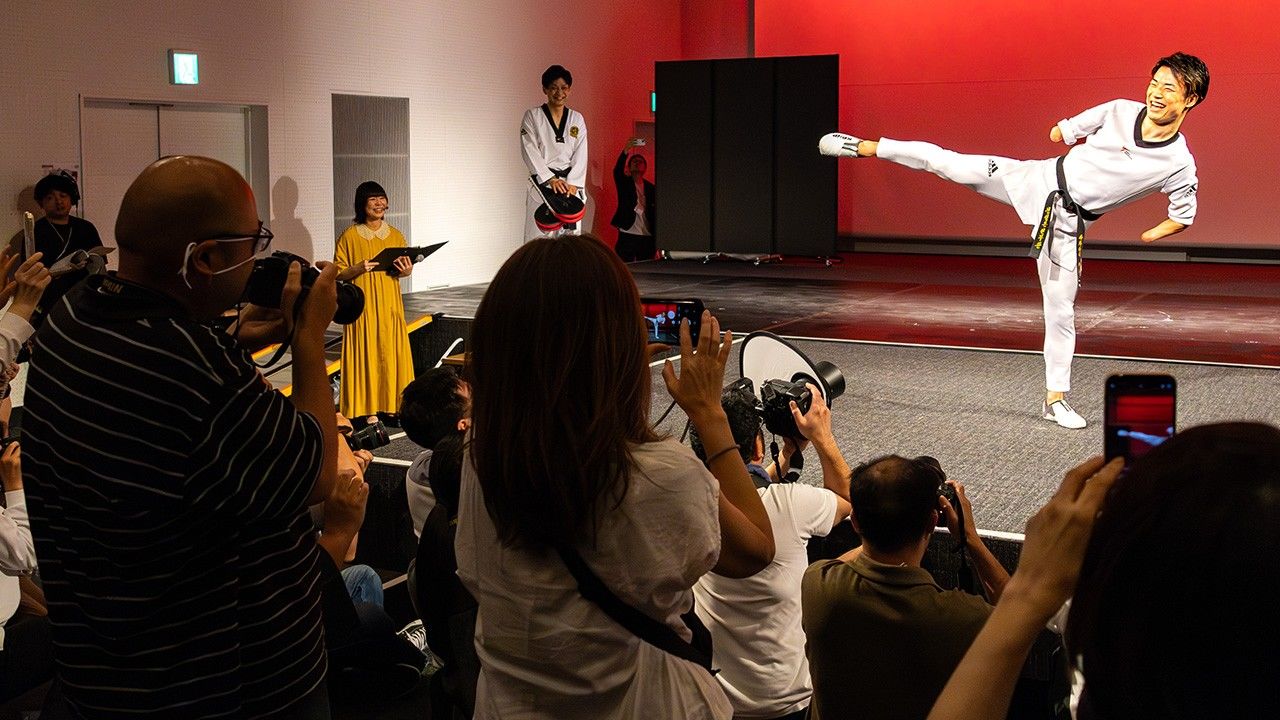
New Takes on Disability: Tokyo Photography Workshop on Para Athletes
Sports Art- English
- 日本語
- 简体字
- 繁體字
- Français
- Español
- العربية
- Русский
Confidence in the Camera’s Eye
In June 2024, the Tokyo Metropolitan Government convened a photo shoot entitled “Get Closer! Para Athlete Photo Workshop.” Four para sport athletes acted as models for roughly 60 photographers, including high school students and amateur photographers. With two hours to shoot, they captured as much as possible of the athletes’ poses and expressions.
Seryū Monika, set to represent Japan in the paracanoeing competition at the Paris 2024 Paralympic Games, commented that the photo shoot “was a completely new experience. I came away with a greater love for myself in a wheelchair and more confidence.”
On stage, she “paddled” while seated in her wheelchair, and showed some of her training routine, using a huge watermelon as a weight.
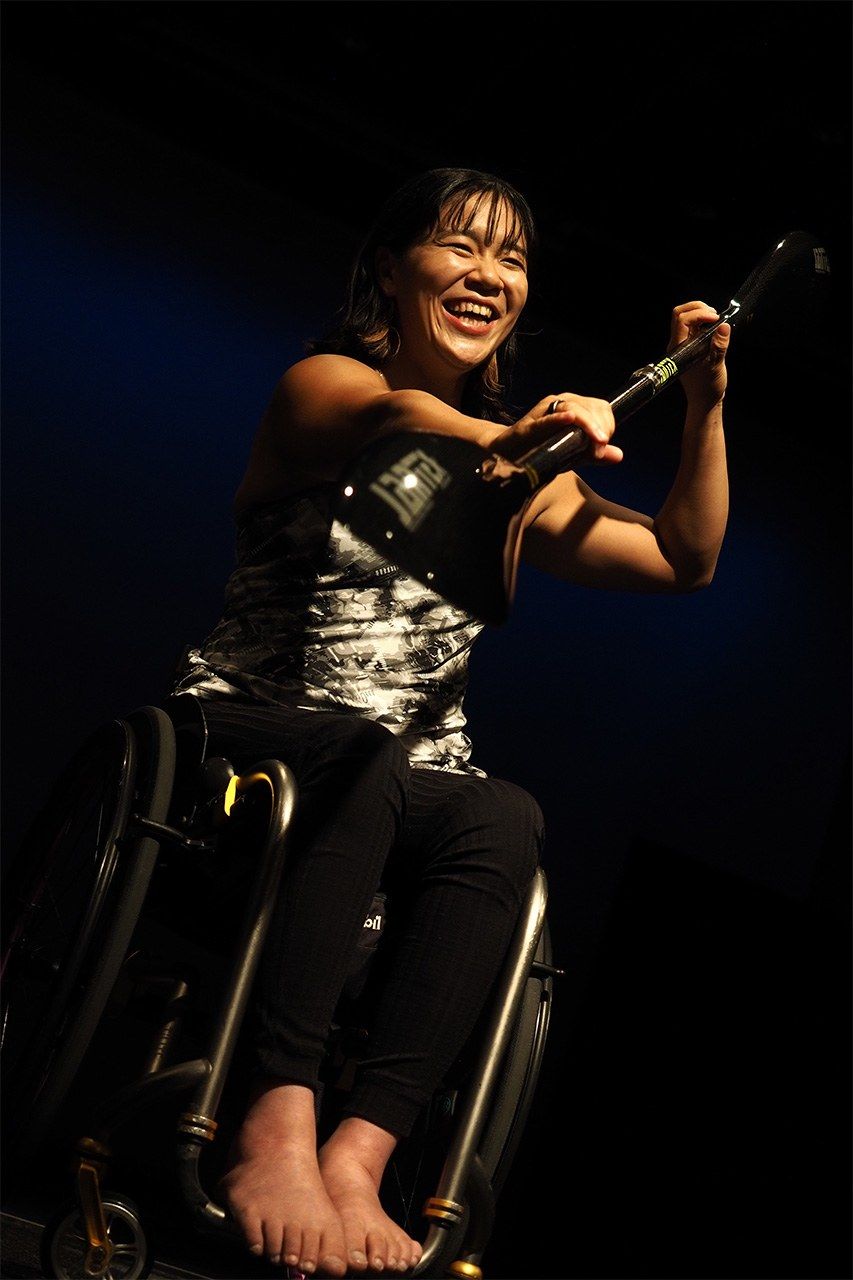
Paracanoeist Seryū Monika. The photographer, Honma Asako, a student at Kurumenishi High School, said, “I tried to capture her best facial expression.” (© Honma Asako)
Seryū was paralyzed from the waist down when her spinal cord was damaged in an accident during a physical education class in her first year of senior high school. Ever since, she has used a wheelchair.
She was a canoeist prior to the accident, and restarted the sport the next year, following rehabilitation. A year later, she competed in her first world championships. Paris 2024 will be her third Paralympic Games, after Rio de Janeiro and Tokyo.
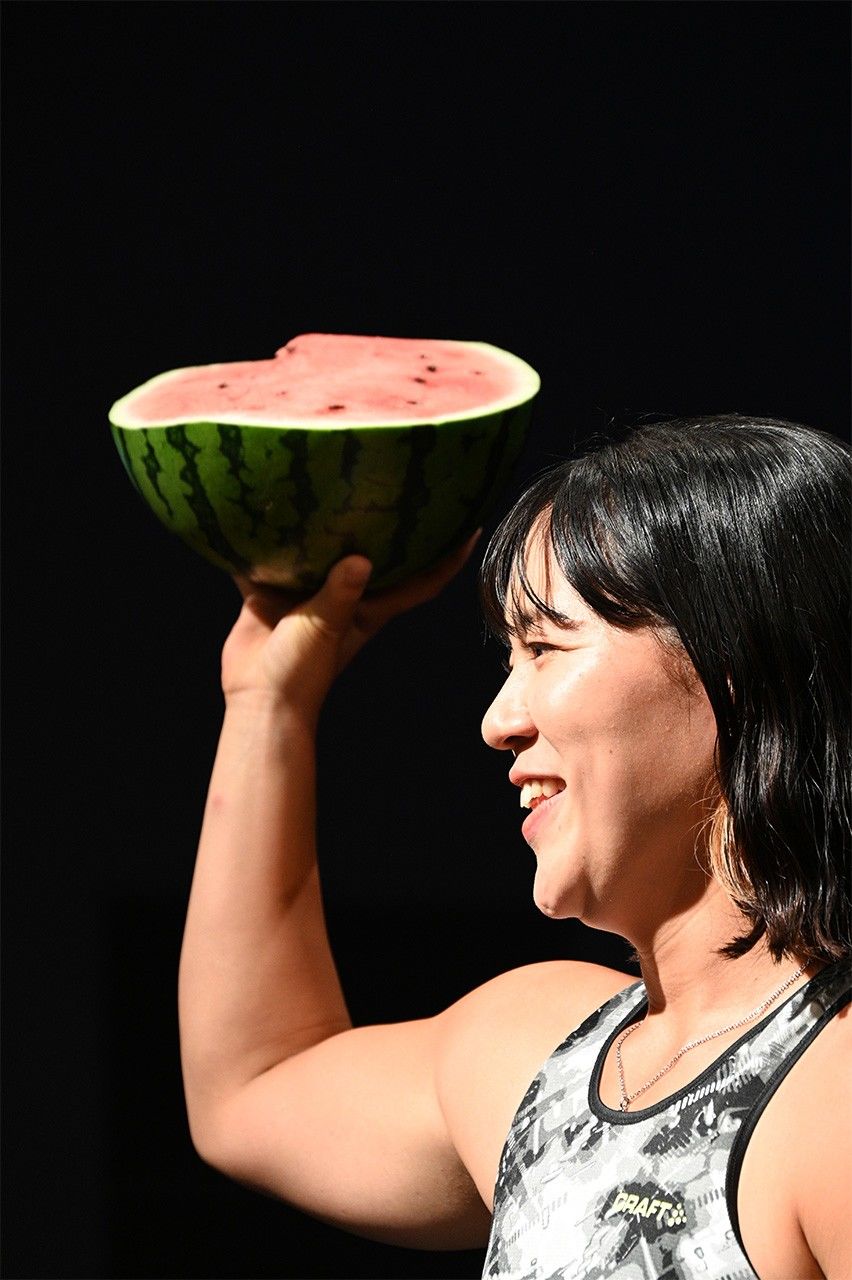
Seryū demonstrates her training techniques using a watermelon. The photographer, Koishikawa High School student Ōsato Mirei, commented: “When I compared her disability with my psychological complex, I felt an affinity with her.” (© Ōsato Mirei)
Seryū says that when she first began using a wheelchair, she hated to see photos of herself. But by physical training and through multiple victories, she was able to gain greater confidence.
“When I saw the photos of myself at the photo shoot, I honestly felt they looked good. When I first became disabled, I hated to see photos of myself, because they were a painful reminder that I was different from others—but not anymore. I hope that the photos of me can inspire people with disabilities who are struggling to reintegrate into society.”
Photographing the Athletes’ Motivation
Two students from Tokyo, members of their school photography club, demonstrated how to take pictures during the photo shoot. One of them, Ōsato Mirei, a senior at Koishikawa High School, photographed Seryū lifting the watermelon and commented, “I was amazed at the powerful muscles in her arms.”
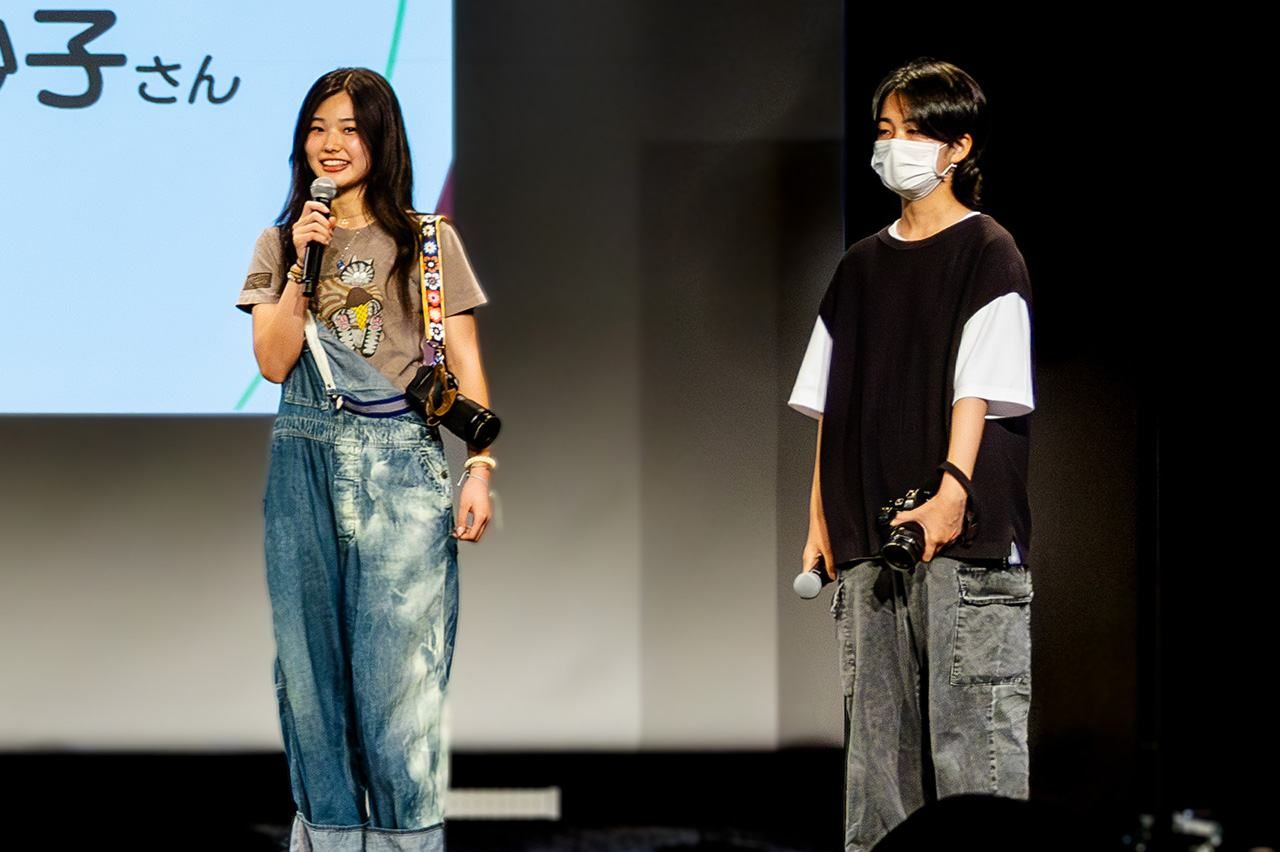
Photography demonstration by students Ōsato (left) and Honma. (© Fujiwara Tomoyuki)
It was Ōsato’s first time photographing people with disabilities. She remarked that, when she observed the athletes through the view finder, her attention was drawn to the strength of their highly trained muscles rather than their disability.
“It was my first encounter with para sports, my first time to meet para- athletes, and of course, my first opportunity to photograph them, so I was excited at the chance to do something new. Each person has his or her own unique individuality. I was so impressed by their attitude—even though there are some things they can’t do due to their disability, they keep striving to improve.”
Capturing Charisma
There is still a lot of discrimination and prejudice, and people tend to feel pity towards those with disabilities. Many para athletes have been subjected to such attitudes. But for this photo shoot, rather than “pretending not to notice the disability,” the focus was on the strength and beauty of the athletes, while fully acknowledging their respective disabilities.
Photographer Ochi Takao directed the photography. He has covered para sports since the Sydney 2000 Paralympic Games.
“Para athletes are more than just charismatic: they also produce incredible results. For example, an athlete whose leg has been amputated above the knee may jump over 7 meters with an artificial leg.”
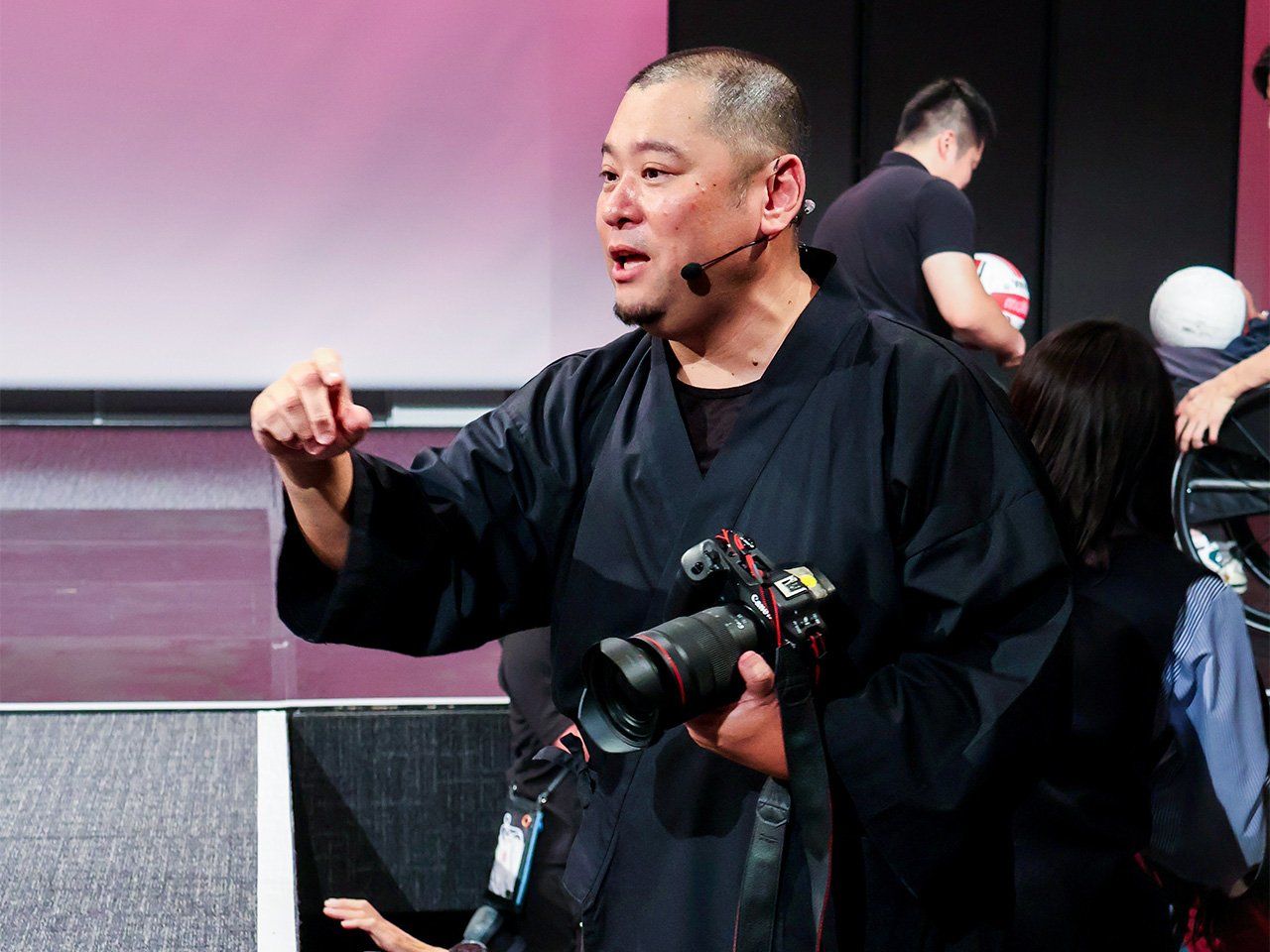
Photographer Ochi Takao has covered para sports for over two decades. He addressed the photographers at the event: “Para athletes are truly charismatic.” (© Matsumoto Sōichi)
Ochi explained that, when he attends competitions, he goes to extreme lengths, even lying on the ground for a good angle, to achieve the composition he has in mind. “Para athletes are pioneers, continuing to venture on untrodden paths.” He advised the group to “consider how to capture that aspect visually.”
Amazing Skills
“Crash!”
The sound of metal on metal rang throughout the venue as two wheelchairs collided. Hashimoto Katsuya and Nakamachi Shun’ya, both from Japan’s wheelchair rugby Paralympic Games team, re-created a tackle for the photo shoot.
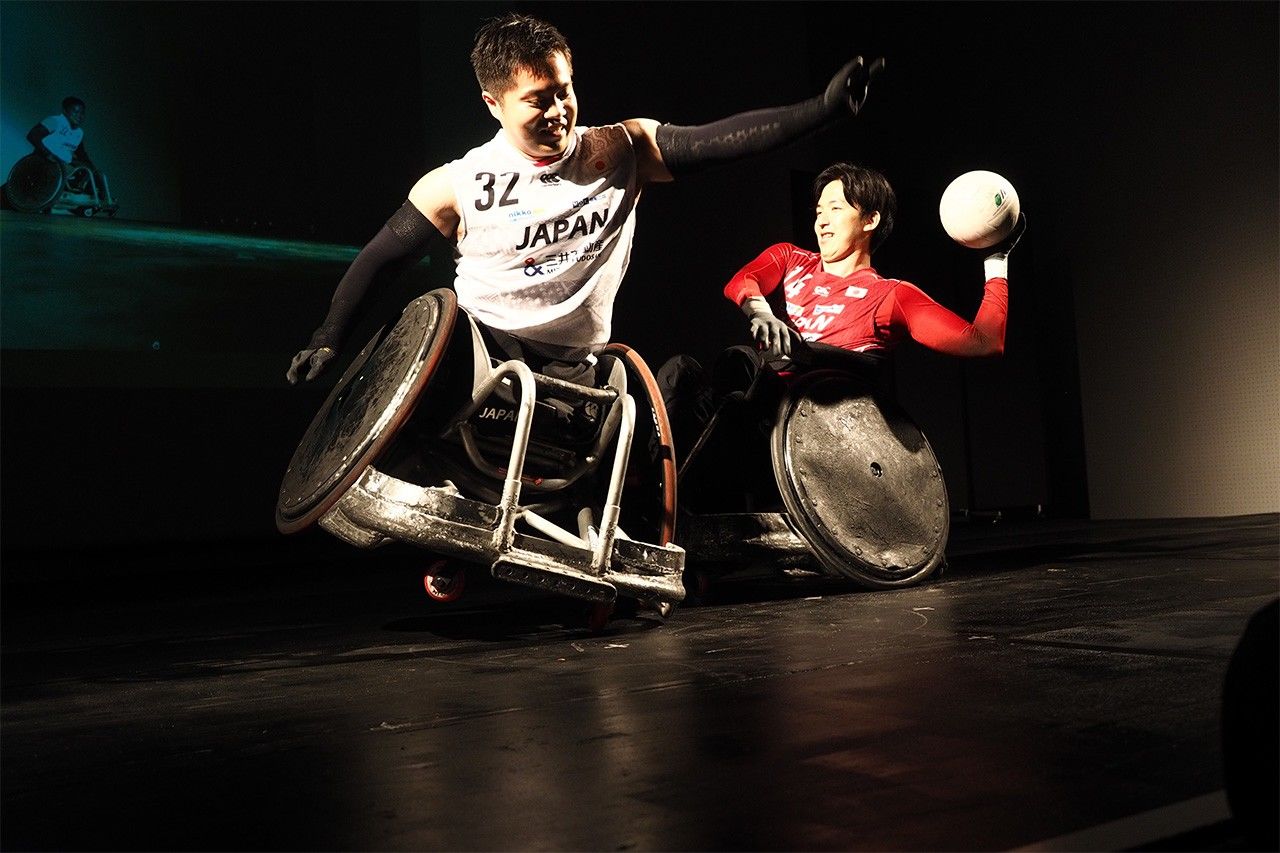
Wheelchair rugby team members Hashimoto (left) and Nakamachi perform a tackle. According to the photographer, “This scene made me want to better capture the expressions and emotions of the athletes.” (© Honma Asako)
Kurumenishi High School student Honma Asako, one of the demonstrators, was excited to capture the moment of impact that lifted one of the wheelchairs into the air, “I was astonished at their amazing skills.”
A member of Honma’s family also has a disability. But despite the fact that she has daily interaction with this person, she was still deeply moved at the event.
“People often say a disability is a unique trait, but that had never rung true for me, even with a disabled member of my family. When I photographed the para athletes, it was the first time I realized that they can express their uniqueness the same as anyone.”
“Look at Us, Understand Us”
Although the athletes have experience competing internationally, they had rarely been the focus of so many cameras at once. Hashimoto said, “I was nervous, but actually I quite enjoyed being photographed,” while Nakamachi remarked, “The nervousness and enjoyment was different to what I experience in competition.”
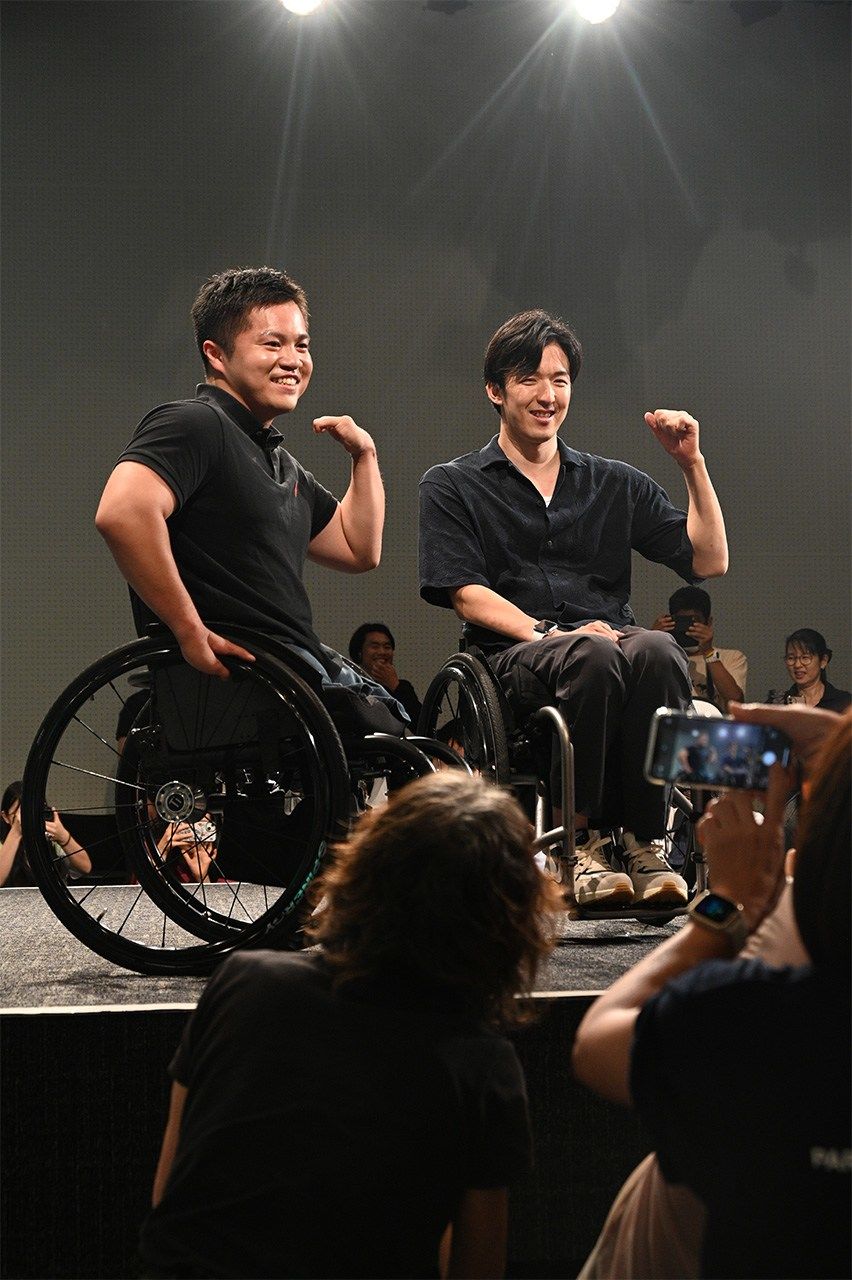
Wheelchair rugby team members Hashimoto (left) and Nakamachi. Ōsato says she “wanted to photograph the two athletes smiling at the camera and the cheering audience to express the wide support they have.” (© Ōsato Mirei)
Because the Tokyo 2020 Summer Paralympic Games, in 2021, were staged without an audience, many events were broadcast on national television due to the COVID-19 pandemic. Japan won 51 medals, and consequently, public awareness of para athletes grew alongside that of regular athletes.
Japan’s national wheelchair rugby squad, with athletes selected from teams across the country, is believed to have a chance of securing a medal at the Paris Paralympic Games. Hashimoto and Nakamachi are familiar members, and thus they aroused exuberant cheering from the photo shoot participants.
Hashimoto was born with disabilities to both his upper and lower limbs. In junior high, he was very conscious of people staring at him, and did not like to be photographed.
But that has changed. “Now I have a strong desire for people to know about my body. Interacting with people with various disabilities at sporting events has helped me to overcome shame about my body. Being watched has helped deepen my understanding of disabilities.” He vowed to do his best in Paris to further advance this transformation.
Perceptions Changed by the Tokyo Paralympics
Awareness about people with disabilities has been changing since the Tokyo Paralympic Games. According to a survey of people with disabilities conducted by Kyōdō News through Japan Disability Forum in late 2021, following the Tokyo Paralympic Games, 70% of respondents believed that the event had helped, or at least partially helped, to improve public understanding of their disability or disabilities in general.
Taekwondo athlete Awatari Kenta, born with two disabled upper limbs, stressed that “The Tokyo Paralympic Games had a significant impact.”
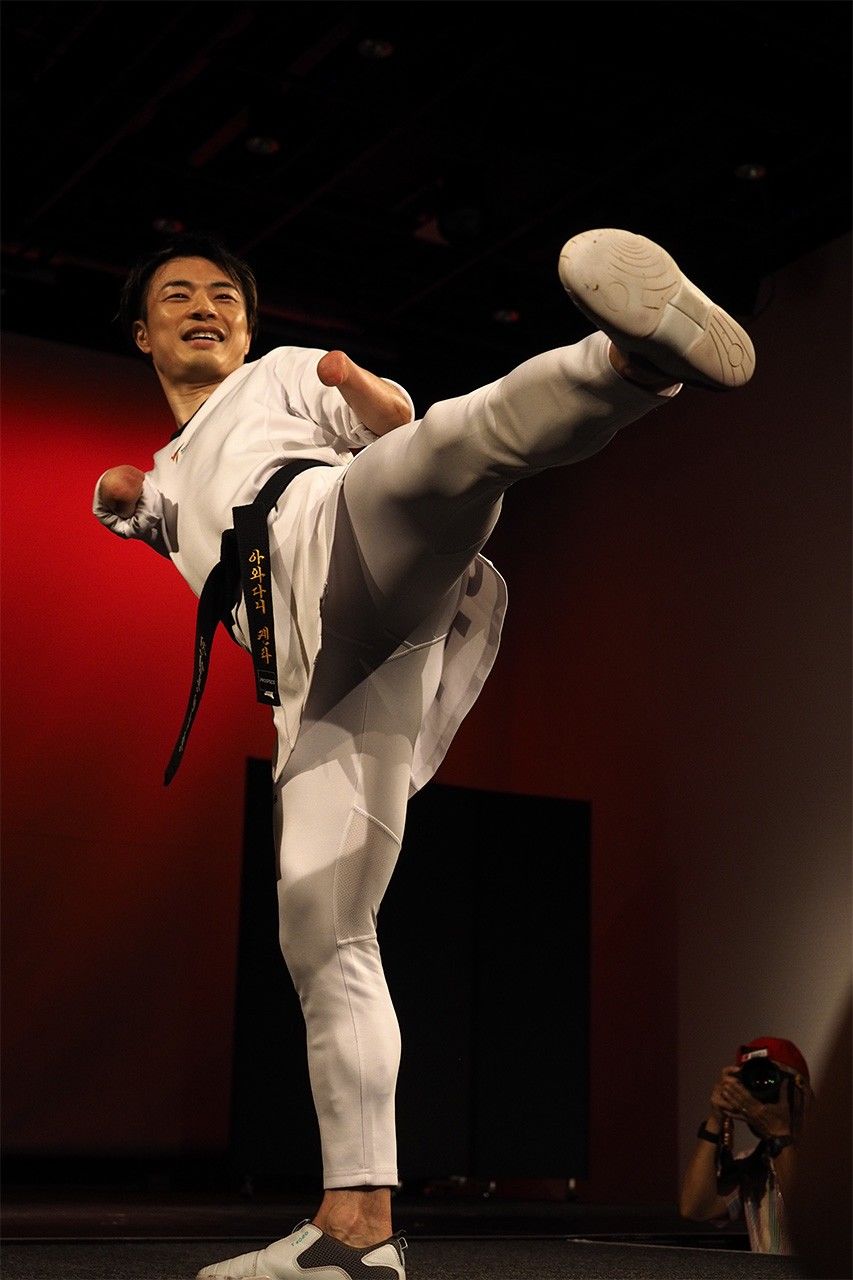
Para taekwondo athlete Awatari Kenta. Honma said “He’s not just cool, the smile on his face from doing what he loves is also appealing.” (© Honma Asako)
Says Awatari: “In the past I was stared at in the street and told I look repulsive. I hated it, especially during my adolescence. But the Tokyo Paralympic Games helped to change that aspect of society, and I think that the public has warmed toward people with disabilities. I’ve also grown to like myself more.” When social perceptions change, it can also change the feelings of people with disabilities. Awatari has experienced this change personally.
Although he cannot compete at the Paris Paralympic Games, he will continue fighting in international tournaments.
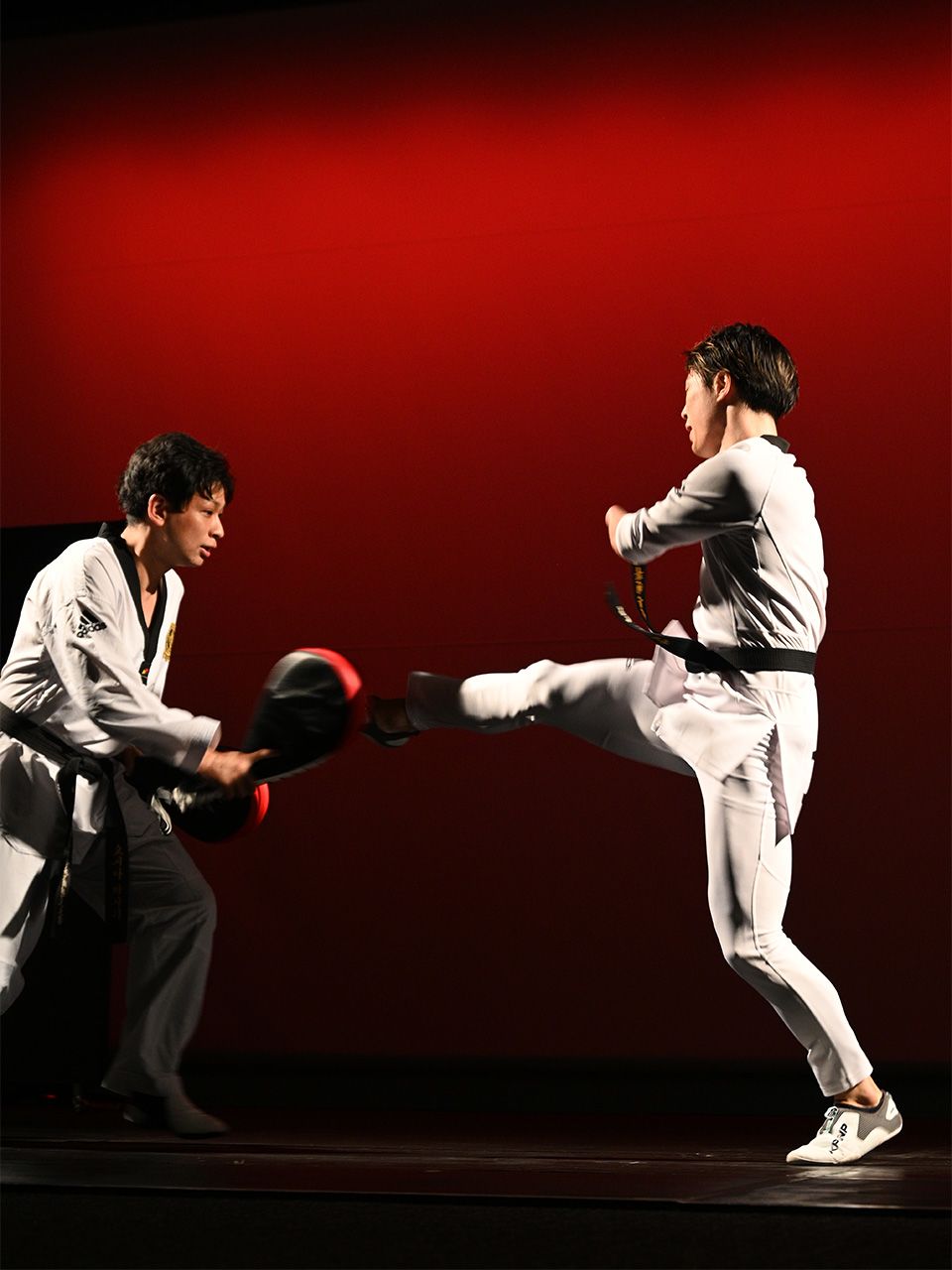
Para taekwondo athlete Awatari Kenta (right). Ōsato said, “I was simply amazed at Awatari’s skills. I was desperate to capture his lightning-speed moves in my photos.” (© Ōsato Mirei)
There was one common wish expressed by all of the athletes who attended: “We want you to watch the competition.” At the end of the photo shoot, the athletes reiterated their hopes that the attendees will watch para sports live or on television.
In an interview after the photo shoot, Ochi described his experiences photographing para athletes.
“I believe it’s important to photograph the beauty and charisma of the competitors in the same way one would approach beautiful scenery. By suppressing the common tendency to focus on a person’s disability, and instead trying to enjoy the competition and get to know the athletes better, has opened up a new world to me. I hope more people will watch the Paris Paralympic Games in this way.”
The Paris Paralympic Games runs for 12 days, from August 28 to September 8.
(Originally published in Japanese. Banner photo: The “Get Closer! Para Athlete Photo Workshop” photo shoot organized by the Tokyo Metropolitan Government in the lead-up to the Paris 2024 Summer Paralympic Games. © Fujiwara Tomoyuki/Nippon.com.)
Related Tags
photography Paralympics athlete 2024 Paris Olympics and Paralympics
